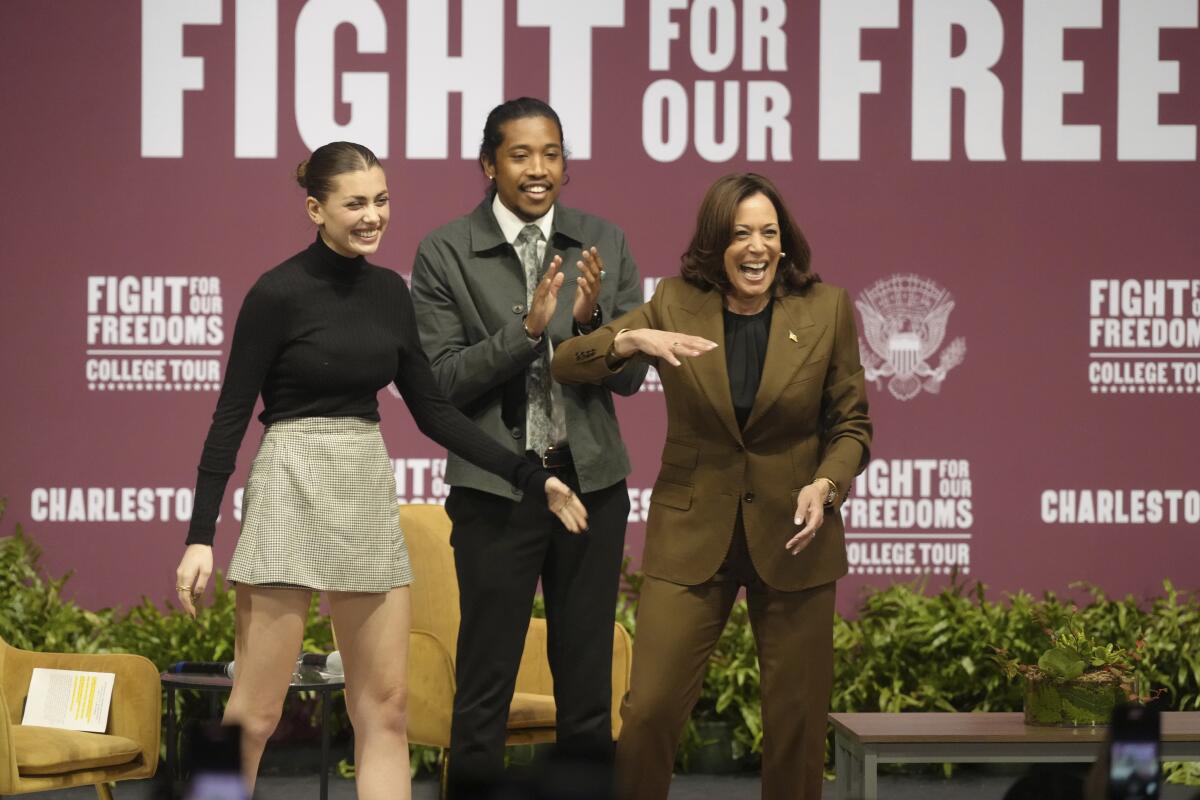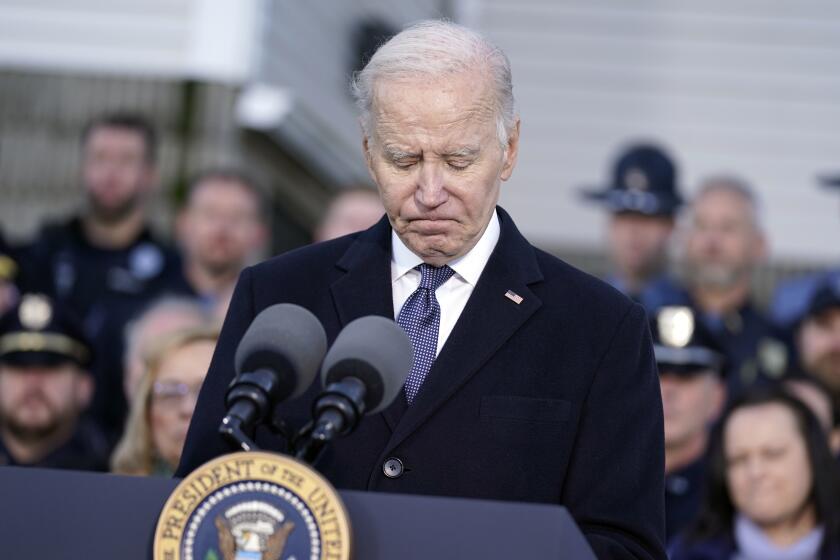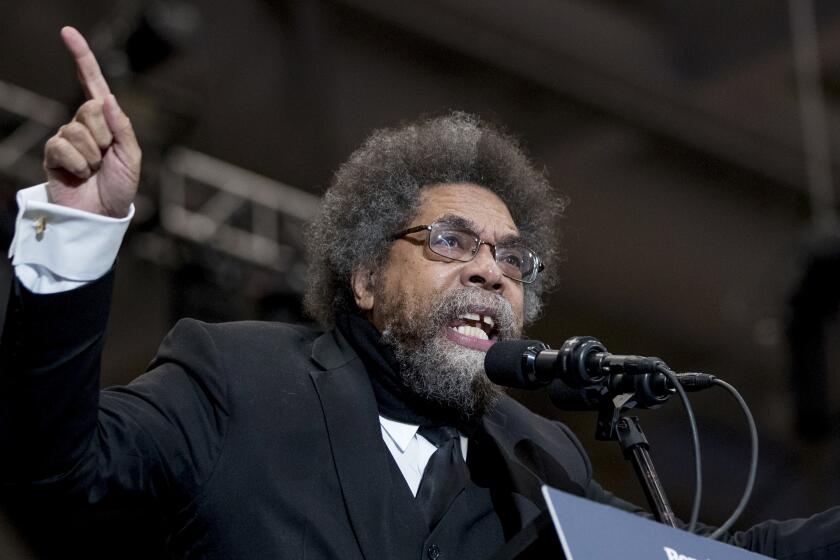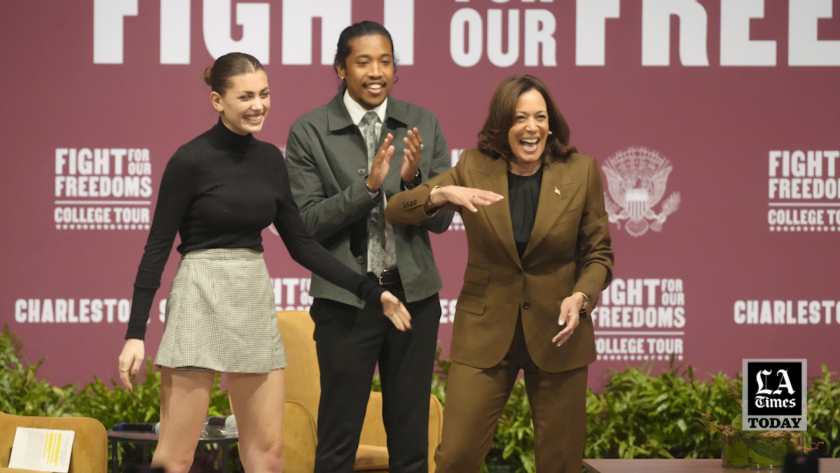Why Kamala Harris prefers Gen Z to millennials, and why it matters

WASHINGTON — Vice President Kamala Harris prefers Gen Z to millennials.
“I love Gen Z,” she told a crowd of donors at the Ritz-Carlton in Boston earlier this month while reflecting on her “Fight for Our Freedoms” college tour, which took her to campuses across eight states in September and October.
The threats of gun violence, climate change and rollbacks of abortion rights are “a lived experience” for young people, she said, “and they are not going to be patient about us getting something done. And I love that about them.”
Over the last year, Harris, 59, has focused on energizing young voters, who were essential to the vice president and President Biden’s 2020 victory and will be key to the Democrats’ reelection bid next year.
Biden won roughly 60% of 18- to 29-year-old voters in 2020. But young voters have since soured on the oldest-ever president, who turned 81 on Monday. An NBC News poll released Sunday indicated Biden had the support of only 42% of voters aged 18 to 34 compared with 46% who support former President Trump, a Republican, in a hypothetical general election race.
That poll found 70% of Democrats ages 18 to 34 disapprove of Biden’s handling of the Israel-Hamas crisis.
A UC Berkeley-L.A. Times poll shows approval of President Biden has dropped among key voter groups. In solidly Democratic California, he still tops Donald Trump.
And a New York Times/Siena College poll released earlier this month found a surprising fault line in the Biden-Harris coalition: Of Harris’ would-be supporters — a majority of whom are nonwhite or younger than 30 — 11% do not back Biden. If Biden had captured Harris’ would-be supporters, he would have led Trump in the overall poll, according to the New York Times.
Instead, the poll showed Biden virtually tied with Trump among voters under 30, with 30% backing the president and 29% backing his predecessor.
The findings support what Harris aides and advisors have argued for months: Despite her unfavorable ratings in polls of registered voters as a whole, the vice president motivates young voters of color.
After struggling to make significant progress on her initial assignments, which included curbing immigration from Central America and expanding voting rights protections, Harris has sought to find her footing by taking strong stands on abortion rights, gun violence, the climate crisis, student loan debt relief and other issues that matter most to young people.
“She has a portfolio now that people do pay a lot of attention to,” said Celinda Lake, a veteran Democratic strategist who was one of two lead pollsters for Biden’s 2020 campaign. “Developing the economies of Guatemala and Central America? I don’t know that that’s seen as a two-sided issue by voters.”
Young people “like her style, they like her record and they like her issues,” Lake added.
In some ways, Harris’ political brand and biography align with the activism that has come to define Gen Z voters (those born between the mid- to late 1990s and the early 2010s), who are more racially and ethnically diverse than previous generations. Harris has frequently referred to her parents’ involvement in the civil rights movement during the 1960s as playing a definitive role in propelling her into California politics and ultimately to the White House as the nation’s first female, Black and Asian American vice president.
“She’s like, ‘I come from a family who was not afraid to go out and protest.’ ... I think that’s something she understands — Gen Z is not taking it lying down,” said Annie Gonzalez, an actress who appeared in the Hulu film “Flamin’ Hot” and moderated Harris’ college stops at Reading Area Community College in Pennsylvania and the College of Southern Nevada outside Las Vegas.
And although campaign officials are counting on a contrast with Trump in next year’s election, Gen Z voters are not bound by party loyalty and tend to favor issue-oriented candidates, according to Lake. Third-party candidates such as Robert F. Kennedy Jr. or Cornel West could also take away from Biden’s coalition, she added. (Kennedy had the support of 34% of voters under 30 in the New York Times/Siena poll.)
Harvard professor and progressive activist Cornel West says he’s now running for president in 2024 as an independent, not as a member of the Green Party.
The issues that Harris has built a new profile around — abortion, voting rights, discrimination in education — “lend themselves to taking a stronger stand that young voters are more responsive to,” Lake said.
“This is the most politically active generation of young people that our country has had, and so we don’t need to be told what to care about,” said 26-year-old Rep. Maxwell Frost (D-Fla.), the first Gen Z member of Congress by most measures. “We want to feel validated in our concerns, and we want to see our leaders present a plan on how we fix it.”
Harris decided to launch her nine-stop college tour, timed to coincide with students’ return to campus for the new academic year, after spending the summer taking on a more visible role in what she has described as the fight against Republican extremism.
In July, she delivered a fiery response in Jacksonville, Fla., after Gov. Ron DeSantis, a 2024 GOP contender, imposed a new curriculum that said enslaved people “developed skills which, in some instances, could be applied for their personal benefit.”
Days later, she hastily arranged a trip to Iowa — whose conservative governor had just signed a strict abortion law that has since been placed on hold — to discuss reproductive rights. The timing was deliberate: She arrived the same day Trump and other GOP presidential candidates were attending a fundraising dinner there.
Earlier this month, she flew to South Carolina to formally file Biden’s paperwork to appear on the Democratic primary ballot there. The state was responsible for helping Biden turn around his struggling 2020 campaign, and in return the president help put the Palmetto State ahead of Iowa and New Hampshire on the party’s nominating calendar.
“She’s a visible representation of the bite that this administration is bringing,” Quentin Fulks, Biden’s deputy campaign manager, told The Times.
Harris is expected to launch another tour focused on reproductive rights in January, according to a source familiar with her planning.
But the momentum the vice president has built on college campuses has been eclipsed by the party’s divisions over the Israel-Hamas war. Biden resisted growing calls from Arab allies and progressive members of his party to call for a cease-fire amid Israel’s military campaign in the Palestinian Gaza Strip.
The president, who wrote in a Washington Post op-ed published Saturday that “a ceasefire is not peace,” has instead pressed for temporary humanitarian pauses to allow the release of hostages and for more aid to be sent into Gaza.
Critics argue Biden’s unconditional support for Israeli Prime Minister Benjamin Netanyahu’s right-wing government and the country’s military campaign has been lopsided and exposed a double standard in Biden’s foreign policy.
“This is a tough one,” said Frost, who was one of 33 representatives in the House and one senator who signed a letter in October calling for a cease-fire. “Even me as a progressive leader, it’s something I’ve been wrestling with — how do we move forward as a movement?”
Divisions over the conflict could undermine Biden’s support, Frost added.
“It’s still something we’ve got to work through here, and I do believe it presents some complications” in the coalition, he said.
On college campuses, some Jewish and Arab or Muslim students and professors have feared for their safety as heated debate over the conflict has at times turned violent.
Harris’ college tour was winding down as protests heated up. But at her final stop at Northern Arizona University in Flagstaff on Oct. 17, 10 days after Hamas militants attacked Israel, a student confronted her about the growing casualties in Gaza.
Harris responded by largely echoing her boss, saying Israelis and Palestinians “both deserve peace, deserve self-determination, and deserve safety,” and emphasizing the distinction between Hamas, which the U.S. deems a terrorist organization, and Palestinian civilians.
“Stop talking — do something,” one student shouted, according to AZPM, a local PBS and National Public Radio affiliate.
Victor Shi, a 21-year-old podcaster and a senior at UCLA, served as the youngest delegate for Biden at the 2020 Democratic National Convention. Shi, who recently talked with National Security Council spokesman John Kirby on the podcast “iGen Politics,” which he co-hosts with former Watergate prosecutor Jill Wine-Banks, said he’s heard lots of frustration with the administration’s resistance to a cease-fire.
“I’ve heard more people say, ‘I’m just going to tap out of the process altogether,’” Shi said, noting that social media has been flooded with misinformation about the conflict.
The decades-long conflict doesn’t fit neatly into a two-minute TikTok video, and combating misinformation and fine-tuning the administration’s stance will take time, Shi said.
But drawing a contrast with Trump does seem to work, he added. “It’s not satisfying to anyone I talk to, but I think just framing it in terms of that choice in 2024 has worked,” he said.
But the messenger matters, Shi said, and although young people may tune out Biden, Harris’ energy and age are an asset.
“Perhaps not many people will listen to someone like President Biden, given his age,” Shi said, “but having someone like Kamala Harris ... there’s a hunger for that.”
Watch L.A. Times Today at 7 p.m. on Spectrum News 1 on Channel 1 or live stream on the Spectrum News App. Palos Verdes Peninsula and Orange County viewers can watch on Cox Systems on channel 99.
More to Read
Get the L.A. Times Politics newsletter
Deeply reported insights into legislation, politics and policy from Sacramento, Washington and beyond. In your inbox three times per week.
You may occasionally receive promotional content from the Los Angeles Times.














